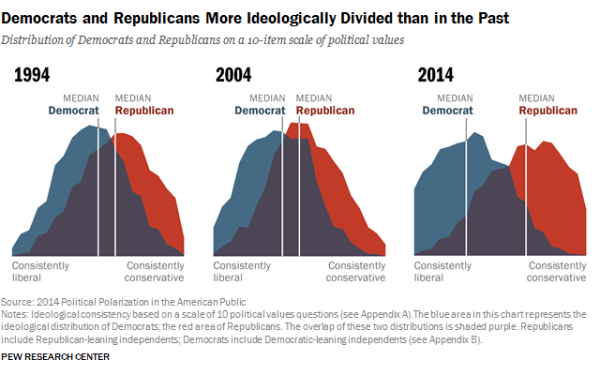What’s Wrong Today:
In early June, Pew Research published a study called Political Polarization in the American Public. It reported that Republicans and Democrats are more divided along ideological lines than at any point in the past two decades. They surveyed 10,000 adults nationwide and the headline result was that these divisions are greatest among those who are the most engaged and active in the political process. The political center is shrinking while those at the left and right limits are growing. Here is a graph from the report:
Now, Pew gives us more reason to be concerned about the future of our politics. The latest Pew Research Center’s political typology report was published on June 28. It sorted voters into 8 cohesive groups based on their attitudes and values, providing us with a political field guide for the elections in November. One of the groups is called “Bystanders”. They are 10% of the voting-age population. Despite all of the movement we see above among other groups, Bystanders were also 10% of voting-age population in 2011. They are one group that will pay little, if any attention, to America’s midterm elections this November. From Pew Research: (emphasis by the Wrongologist)
Overall, 10% of Americans are what we call Bystanders, or the politically disengaged…None of this cohort say they’re registered to vote, and none say they follow government and public affairs most of the time (this compares with 48% of Americans overall). Virtually all of this group (96%) say they’ve never contributed money to a candidate running for public office
Bystanders are young: 38% are under 30, compared to 22% of the general public; 67% have a high school education (or less), vs. 40% of the general public. Nearly a third (32%) are Hispanic and 29% are not citizens.
Although Bystanders view the Democratic Party more favorably than the GOP, they have a mix of liberal and conservative attitudes. They are sympathetic to the plight of the poor, but as many say that government aid to the poor does more harm than good as vice versa. They express fairly liberal views on homosexuality and same-sex marriage, but 54% say abortion should be illegal in all or most cases.
Asked about their interest in a number of topics,
• 73% of Bystanders say they have no interest in government and politics
• 66% say they are not interested in business and finance
• 66% think of themselves as an “outdoor person”
• 64% of Bystanders are interested in celebrities and entertainment (vs. 46% of the public)
• 35% call themselves a “video or computer gamer” (vs. 21% of the public)
Every aspect of our demography is being fundamentally transformed. Huge gaps have opened up in our political and social values, our economic well-being, our family structure, our racial and ethnic identity, our gender norms, our religious affiliation, and our use of technology. Are these people our future?
In the Pew survey, Bystanders were more likely than other political cohorts to answer “don’t know,” more likely to say they’ve “never heard of” the topic in question or to refuse to answer questions altogether.
So, taking away the 29% of Bystanders who aren’t US citizens and can’t vote, there are 71% of 10% of voting age Americans − some 7.1% of eligible voters − who could vote if they wanted to register. Or if they can register, since several states have added voter suppression laws since the Supreme Court decision in Shelby County vs. Holder last year.
What would it take to get them to pay attention politically? The 38% of the Bystanders who are Millennials are most likely to have common cause with the Democrats. If even half of them were convinced to register and were to vote blue in 2014 that would be a 2% boost for the Dems.
It might go a long way towards keeping the Senate with the Democrats in November.
Our last 4 presidential elections were based on negative messaging, by Republicans against Obama and by Democrats against GW Bush. We will not end the political polarization or bring the Bystanders into active citizenship until each party offers a positive vision with realistic programs backing it up.
We have to rebalance the social compact to better bind our young and old. Otherwise we will lose these young, less educated Americans who are more interested in celebrities than in the constitution.
In tomorrow’s world, yesterday’s math will not add up.

